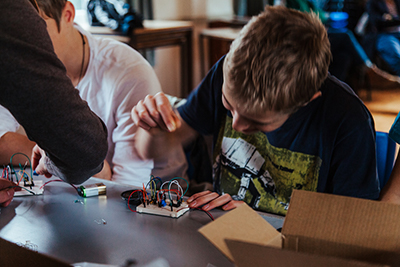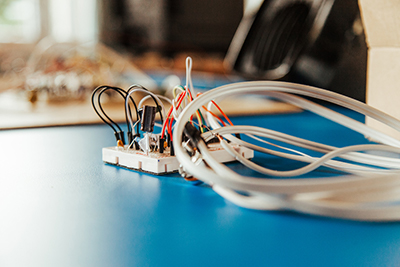“It started from those concerts where we were inviting people to play instruments on stage with experienced musicians regardless of experience”, says Matt. “I spent a while wondering how people could do that at home because it could solve the problem many people face of not being able to afford music lessons or instruments, or who want to learn music in a way that is more suitable than learning to read traditional music. If I could show children how to make electronic instruments on a small budget, without needing to have a soldering iron, they could make them at home and explore how to play them alone or with friends - it can be a social thing.”
Matt realised that the creativity in building electronic instruments was similar to the creativity in using modular synths. “It's kind of instantly modular if you consider electronic components as modules themselves: you can take a resistor out and replace it with a different one to make a different pitch; replace a potentiometer with an LDR to change the way you perform the sound; add one circuit to another to modulate the sound.”
“The co:noise tutorials and workshops do all that.”
The workshops have had some great feedback too – that’s nice things that people have said, rather than guitar distortion! Although plenty of that too. “Lots of lovely noise and my son was so proud of his synth” was one comment from a parent, while a secondary school teacher said that “we only show children how to use standard instruments and we can’t do things on the music tech side of things, so this has been brilliant for the them. It’s such a different side of making music that they are used to.”
As Matt says: “This project is something for girls and boys to enjoy alike - at one workshop we ran, a girl looked at the electronic instruments laid out and commented that it was ’going to be a workshop for boys’, but she got involved and soon realised it wasn’t and went away really inspired and enthused.”
Matt is steeped in experimental music. His favourite artists include Sonic Youth, Suzanne Ciani, Steve Reich and Stereolab. He founded the band Mildred Maude in 2014, a three-piece notable for the fact that they have only one song, “CPA”, which is constantly evolving through improvisation and different recordings, edits, mixes and live performances. Expect howling feedback, ferocious drumming, rumbling bass but also plenty of tunefulness – a bit like Mogwai or a more melodic My Bloody Valentine.



